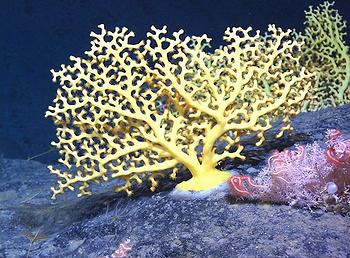
CHICAGO, Illinois, February 18, 2014 (ENS) – The deep ocean is Earth’s least explored environment, but that is rapidly changing. Scientists are calling for a new stewardship ethic as technological advances open the ocean deeps to the extraction of oil and gas, minerals and precious metals, and the dwindling supply of land-based materials creates economic incentives for deep sea industrialization.
The deep sea holds a nearly infinite amount of genetic diversity, some of which could provide novel materials or future therapeutics to treat human diseases, but if not protected, these could be disturbed or lost before humans discover them.

“We’re really in the dark when it comes to the ecology of the deep sea,” said Linwood Pendleton, director of the Ocean and Coastal Policy Program at the Nicholas Institute for Environmental Policy Solutions at Duke University. “We know a lot about a few places, but nobody is dealing with the deep sea as a whole, and that lack of general knowledge is a problem for decision-making and policy.”
Pendleton spoke at the symposium “Deep Ocean Industrialization: A New Stewardship Frontier” held Sunday at the annual meeting of the American Association for the Advancement of Science in Chicago.
Cindy Lee Van Dover, director of the Duke University Marine Laboratory, and Lisa Levin, a biological oceanographer at the Scripps Institution of Oceanography at the University of California, San Diego, joined Pendleton and other scientists in calling for a stewardship approach to deep sea development.
“It is imperative to work with industry and governance bodies to put progressive environmental regulations in place before industry becomes established, instead of after the fact,” Van Dover said. “One hundred years from now, we want people to say ‘they got this right based on the science they had, they weren’t asleep at the wheel.’”
Lisa Levin, a biological oceanographer at Scripps Institution of Oceanography in San Diego, believes the vital functions provided by the deep sea, from carbon sequestration to nurturing fish stocks, are key to the health of the planet.
As the human population has more than doubled in the past 50 years, demand for food, energy, and raw materials from the sea has risen with it, observed Levin, who has conducted research on the deep sea for more than 30 years.
“At the same time, human society has undergone tremendous changes and we rarely, if ever, think about these affecting our ocean, let alone the deep ocean,” said Levin. “But the truth is that the types of industrialization that reigned in the last century on land are now becoming a reality in the deep ocean.”
“Vast tracts of deep seabed are now being leased in order to mine nodules, crusts, sulfides, and phosphates rich in elements demanded by our advanced economy,” she said.
At the same time, rising carbon dioxide emissions are exposing deep-sea ecosystems to additional stress from climate change impacts that include warmer temperatures, altered food supplies, and declining pH and oxygen levels.

As humans ramp up exploitation of deep-sea fish, energy, minerals, and genetic resources, a new “stewardship mentality” across countries, economic sectors, and disciplines is required, Levin said, for the future health and integrity of the deep ocean.
Knowing what kind of regulations to put in place is complicated by the fact that the deep sea crosses political, geographic, and disciplinary boundaries, and there is still much about deep sea systems that is unknown.
Kristina Gjerde, senior high seas advisor to IUCN, the International Union for Conservation of Nature, said, “From a legal perspective, the deep ocean is filled with contradictions. Deep sea mineral resources located beyond national boundaries are part of the ‘Common Heritage of Mankind’ under international law, but the fish and octopi that swim just above the seafloor are not. To prevent harm we can never hope to repair, precautionary rules need to be in place to guide all human uses of the deep ocean across boundaries and across sectors.”
Levin said, “We need international agreements and an entity that can develop and oversee deep-ocean stewardship. .We also need multiple sources of research funding that can help provide the scientific information that we need to manage the deep sea. All of this will require efforts that bridge several disciplines and engage stakeholders in these discussions.”
Engaging stakeholders and society in an issue that takes place miles from land and fathoms underwater can be a difficult task, especially in the face of economic arguments for mining the deep sea for materials used in products that society values, like cell phones and other electronics.
“The deep sea is out of sight, out of mind, and because there isn’t a specific human society that will be directly impacted by the negative consequences of extraction, there’s a whole level of concern that isn’t being expressed when it comes to deep sea industrialization,” Van Dover said. But that doesn’t mean that the consequences don’t exist, from changes in marine food webs to shifts in oceanic and atmospheric chemical composition.
“Extraction from the deep sea is a tradeoff. Is the value of what we’re extracting greater than the damage?” Pendleton asked. “Are there ways to extract that might be more economically costly but have lower ecological impact? How can we repair the considerable damage that has already been done to the sea floor through trawling, pollution, and other practices? These are questions that we need to answer before industrial activity gets ahead of scientific understanding,” Pendleton said.
“There’s just so much that we don’t know about the deep sea, and we need that basic research before we form policy, but we also urgently need policy before this window of opportunity closes,” Van Dover said, “This is environmental management in a place where we’ve never conceived of it before, and we need to start the conversation about how we’re going to go about it.”
© 2014, Environment News Service. All rights reserved. Content may be quoted only with proper attribution and a direct link to the original article. Full reproduction is prohibited.
